BMW X1 VS Peugeot 208 – Specs, Efficiency & Price Comparison
Find out now which car fits your needs better!
The BMW X1 (SUV) is powered by a Diesel, Petrol, Diesel MHEV, Petrol MHEV or Plugin Hybrid engine and comes with a Automatic transmission. In comparison, the Peugeot 208 (Hatchback) features a Petrol, Electric or Petrol MHEV engine and a Manuel or Automatic gearbox.
When it comes to boot capacity, the BMW X1 offers 540 L, while the Peugeot 208 provides 352 L – depending on what matters most to you. If you’re looking for more power, you’ll need to decide whether the 326 HP of the BMW X1 or the 156 HP of the Peugeot 208 suits your needs better.
There are also differences in efficiency: 0.80 L vs 14.10 kWh4.50 L. In terms of price, the BMW X1 starts at 38200 £, while the Peugeot 208 is available from 20200 £.
Compare all the key specs now and find out which model fits your lifestyle best!
BMW X1
The new BMW X1 effortlessly blends sporty elegance with practical functionality, making it a standout choice in the compact SUV segment. Inside, the sophisticated cabin design is complemented by high-quality materials and cutting-edge technology, creating a welcoming and advanced driving environment. On the road, the vehicle's agile handling and responsive performance promise an engaging driving experience, whether navigating urban streets or embarking on longer journeys.
details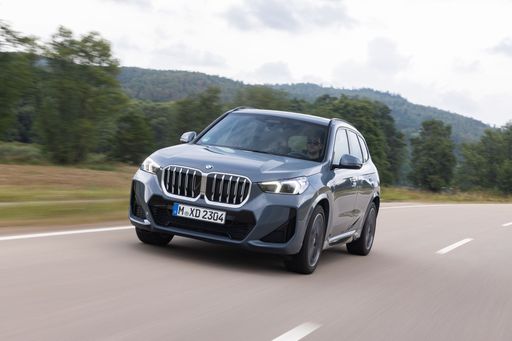 @ press.bmwgroup.com
@ press.bmwgroup.com
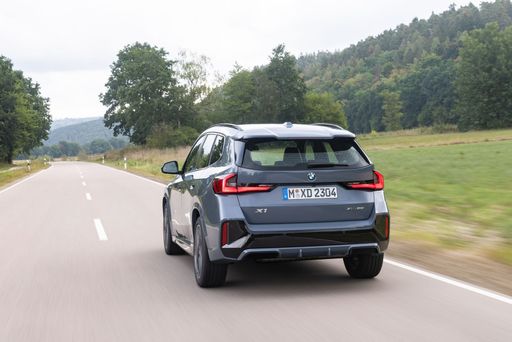 @ press.bmwgroup.com
@ press.bmwgroup.com
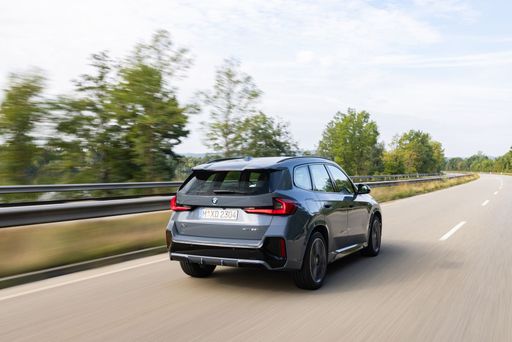 @ press.bmwgroup.com
@ press.bmwgroup.com
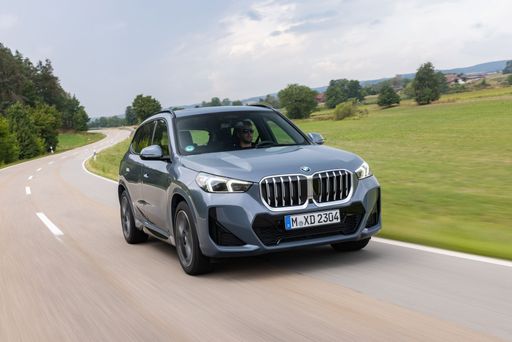 @ press.bmwgroup.com
@ press.bmwgroup.com
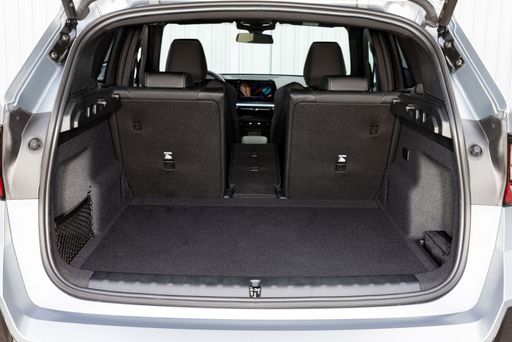 @ press.bmwgroup.com
@ press.bmwgroup.com
Peugeot 208
The Peugeot 208 exudes a distinctive French charm, combining sleek lines with an assertive stance on the road. Inside, it offers a modern and sophisticated cabin, complete with intuitive technology and high-quality finishes to enhance the driving experience. Its agile handling and efficient performance make it a delightful choice for both city commuting and longer journeys.
details @ www.media.stellantis.com
@ www.media.stellantis.com
 @ www.media.stellantis.com
@ www.media.stellantis.com
 @ www.media.stellantis.com
@ www.media.stellantis.com
 @ www.media.stellantis.com
@ www.media.stellantis.com

|

|
|
|
|
Costs and Consumption |
|
|---|---|
|
Price
38200 - 55500 £
|
Price
20200 - 35100 £
|
|
Consumption L/100km
0.8 - 7.7 L
|
Consumption L/100km
4.5 - 5.2 L
|
|
Consumption kWh/100km
-
|
Consumption kWh/100km
14.1 - 15.4 kWh
|
|
Electric Range
81 km
|
Electric Range
362 - 432 km
|
|
Battery Capacity
14.20 kWh
|
Battery Capacity
46 - 51 kWh
|
|
co2
18 - 175 g/km
|
co2
0 - 117 g/km
|
|
Fuel tank capacity
47 - 54 L
|
Fuel tank capacity
44 L
|
Dimensions and Body |
|
|---|---|
|
Body Type
SUV
|
Body Type
Hatchback
|
|
Seats
5
|
Seats
5
|
|
Doors
5
|
Doors
5
|
|
Curb weight
1575 - 1935 kg
|
Curb weight
1165 - 1530 kg
|
|
Trunk capacity
490 - 540 L
|
Trunk capacity
309 - 352 L
|
|
Length
4500 - 4505 mm
|
Length
4055 mm
|
|
Width
1845 mm
|
Width
1745 mm
|
|
Height
1622 - 1642 mm
|
Height
1430 mm
|
|
Payload
490 - 500 kg
|
Payload
380 - 430 kg
|
Engine and Performance |
|
|---|---|
|
Engine Type
Diesel, Petrol, Diesel MHEV, Petrol MHEV, Plugin Hybrid
|
Engine Type
Petrol, Electric, Petrol MHEV
|
|
Transmission
Automatic
|
Transmission
Manuel, Automatic
|
|
Transmission Detail
Automat. Schaltgetriebe (Doppelkupplung)
|
Transmission Detail
Schaltgetriebe, Automat. Schaltgetriebe (Doppelkupplung)
|
|
Drive Type
Front-Wheel Drive, All-Wheel Drive
|
Drive Type
Front-Wheel Drive
|
|
Power HP
136 - 326 HP
|
Power HP
101 - 156 HP
|
|
Acceleration 0-100km/h
5.4 - 9.2 s
|
Acceleration 0-100km/h
8.3 - 10.9 s
|
|
Max Speed
190 - 250 km/h
|
Max Speed
150 - 200 km/h
|
|
Torque
230 - 477 Nm
|
Torque
205 - 270 Nm
|
|
Number of Cylinders
3 - 4
|
Number of Cylinders
3
|
|
Power kW
100 - 240 kW
|
Power kW
74 - 115 kW
|
|
Engine capacity
1499 - 1998 cm3
|
Engine capacity
1199 cm3
|
General |
|
|---|---|
|
Model Year
2023 - 2024
|
Model Year
2023 - 2025
|
|
CO2 Efficiency Class
D, E, B, F
|
CO2 Efficiency Class
D, A, C
|
|
Brand
BMW
|
Brand
Peugeot
|
BMW X1
The New BMW X1: A Fusion of Innovation and Performance
For those in search of a luxury SUV that masterfully combines technical innovation with driving pleasure, the BMW X1 stands as a paragon of design and engineering excellence. As part of the competitive compact SUV segment, the BMW X1 offers a robust array of features targeted towards both the tech-savvy and the driving enthusiast.
Advanced Engine Options
The BMW X1 delivers a versatile range of powertrains to suit the specific needs of different drivers. From the efficient diesel engines to cutting-edge plug-in hybrid variants, there’s a model for every preference. The diesel variants, including mild-hybrids, provide a balance between fuel efficiency and power delivery. Petrol engines, on the other hand, offer spirited performance with a more traditional feel.
Efficiency Meets Performance
The BMW X1's remarkable range of power, from 136 PS to an impressive 326 PS, caters to diverse driving needs. Models fitted with mild-hybrid technology afford drivers reduced fuel consumption and emissions, with the plug-in hybrid leading the field in eco-efficiency with consumption figures as low as 0.8 L/100km and an electric range of up to 83 km.
Technological Innovation
Stepping inside the BMW X1, drivers are greeted with an intuitive cockpit, seamlessly integrating the latest BMW technology. An advanced infotainment system offers connectivity at the touch of a button, while an array of driver assistance systems ensure that safety and convenience are at the forefront.
Design and Comfort
The BMW X1 exudes a powerful presence on the road with its refined SUV aesthetics. Offering substantial interior space, it comfortably accommodates up to five passengers with ample boot capacity ranging from 490 to 540 litres. BMW also offers various trim levels, including the luxurious M Sport package, that enhance both the aesthetic and dynamic appeal.
Dynamic Driving Experience
BMW enthusiasts will appreciate the dynamic handling characteristics synonymous with the brand. Whether it's the front-wheel drive or the xDrive all-wheel system, the BMW X1 delivers responsive handling and a smooth driving experience, making it ideal for both urban and motorway driving scenarios.
Conclusion
The BMW X1 raises the bar for compact SUVs, offering a harmonious blend of innovation, efficiency, and driving pleasure. For those seeking a vehicle that stands out both in terms of aesthetics and technology, the X1 is undoubtedly a worthy contender.
Peugeot 208
A Glimpse into the Future: The New Peugeot 208
The Peugeot 208, with its sleek design and innovative features, continues to set benchmarks in the automotive industry. As a hatchback, it seamlessly blends style with practicality, offering the perfect solution for urban driving and long-distance travels alike. In this article, we delve into the technical details and innovations that distinguish the latest iterations of the Peugeot 208.
Engine Options: Efficiency Meets Performance
The Peugeot 208 provides an array of engine options catering to different driving preferences. Featuring both petrol Mild-Hybrid technology and full electric powertrains, it offers a versatile range designed to accommodate eco-conscious drivers as well as those who prioritise performance.
With power outputs ranging from 101 PS to 156 PS, and a torque span of 205 Nm to 270 Nm, these machines are meticulously engineered to provide thrilling yet efficient drives. The petrol versions utilise a three-cylinder 1199 cm³ engine, optimising fuel consumption between 4.7 and 5.4 L/100km, while the electric e-208 models boast an impressive range of up to 410 km on a single charge.
Advanced Transmission Systems
The Peugeot 208 models come equipped with an advanced automatic transmission system, employing either a dual-clutch automatic gearbox or a manual transmission, depending on the chosen variant. These systems guarantee smooth gear transitions, thus enhancing driving pleasure and overall efficiency.
Performance and Environmental Considerations
From a performance standpoint, the Peugeot 208 impresses with its ability to accelerate from 0 to 100 km/h in between 8.3 to 10.9 seconds, depending on the model chosen. This level of performance is complemented by a top speed ranging from 150 to 200 km/h, ensuring that the 208 is more than capable of holding its own on the motorway.
With environmental consciousness at the forefront, the vehicle's CO2 efficiency class ranges from A to D, further establishing the Peugeot 208 as a responsible option for modern drivers keen on reducing their carbon footprint.
Comfort and Practicality: A Class Act
The interior of the Peugeot 208 reflects its exterior's stylish flair. It comfortably seats five passengers and offers a boot capacity of 265 to 309 litres, accommodating both city commutes and weekend getaways. Advanced comfort features and a state-of-the-art infotainment system ensure that rides are as enjoyable for passengers as they are for the driver.
Cost Considerations
The Peugeot 208 manages to strike a remarkable balance between cost efficiency and luxury. With prices ranging from €22,950 to €40,825, there is a variant to suit most budgets while still providing a premium experience. Additionally, the monthly costs and costs per kilometre are kept in check, making it an economically sound choice in the long term.
Dimensions and Design: Compact yet Spacious
Measuring 4,055 mm in length, 1,745 mm in width, and 1,430 mm in height, the Peugeot 208 maintains a compact profile that is perfectly suited to tight urban environments. Despite its manageable size, it offers ample space inside, thanks in part to clever design and engineering.
Conclusion: A Future-Proof Choice
The Peugeot 208 is a testament to modern automotive innovation. Whether powered by traditional engines or fully electric powertrains, it consistently delivers on performance, efficiency, and style. The combination of cutting-edge technology and sustainable practices places the Peugeot 208 as a forward-thinking choice for drivers seeking a vehicle that epitomises the best of contemporary motoring.
The prices and data displayed are estimates based on German list prices and may vary by country. This information is not legally binding.
